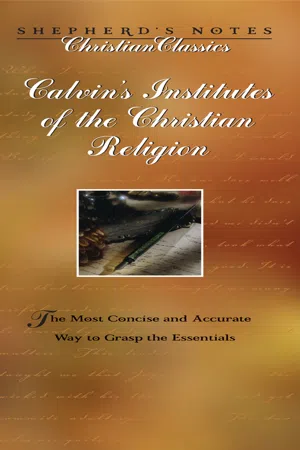![]()
BOOK THREE: THE MEANS,
THE BENEFITS, AND THE
EFFECTS OF GRACE
“It now remains to pour into the heart itself what the mind has absorbed. For the Word of God is not received by faith if it flits about in the top of the brain, but when it takes root in the depth of the heart” (III:II:36).
Following the outline of the Apostles' Creed, Calvin dealt with the knowledge of God the Father in Book 1 and of God the Son in Book 2. In Book 3, he moved to his treatment of the Holy Spirit. Under this broad topic, Calvin discussed the work of the Holy Spirit in repentance, faith, and justification, as well as the nature of the Christian life. And before concluding the book with a discussion of life after death, Calvin explained his doctrine of election.
BOOK-AT-A-GLANCE
| I | The Secret Work of the Spirit |
| II | The Definition of Faith |
| III–V | The Doctrine of Repentance |
| VI–VII | The Christian Life of Self-Denial |
| VIII–X | The Future Life and the Present Life |
| XI–XIX | The Doctrine of Justification |
SUMMARY I: THE SECRET WORK
OF THE SPIRIT
In answer to the understood question at the beginning of Book 3—How do we receive the grace and benefits of Christ?—Calvin's answer is clear: through the Holy Spirit. Calvin explained that the Holy Spirit is the bond that unites us to Christ and that faith is the Spirit's principle work. After describing the many names used for the Holy Spirit in the Scripture, Calvin referred to the Spirit as the “key that unlocks for us the treasures of the Kingdom of Heaven,” affirming that any teaching about the true God is in vain unless the “inner Schoolmaster” teaches and draws believers to the Father.
“Until our minds become intent upon the Spirit, Christ, so to speak, lies idle because we coldly contemplate him as outside ourselves—indeed, far from us” (III:I:3).
Consistent with his earlier teachings, Calvin had little interest in a cold, speculative understanding of God at a distance. The heart of Calvin's message is not simply about God but about what God has to do with us. Using perhaps the most intimate image available, Calvin pictured the Spirit's work as bringing believers into “sacred wedlock” with God.
What, in Calvin's view, are some of the roles of the Holy Spirit in the Christian's life?
SUMMARY II: THE DEFINITION OF FAITH
Calvin began his definition of faith by contrasting it with the Scholastic notion of “implicit faith,” rejecting the idea that faith is the “cold” assent to a set of ideas or a mere passive acceptance of the church's teachings. He willingly admitted that true faith is always surrounded by clouds of errors due to the limitations of the human condition, recognizing that unbelief and faith are always mixed together. But, he argued, there is a radical distinction between those who, striving earnestly to learn more of God, admit their unbelief and those who “sluggishly rest” in their ignorance.
Calvin described the indivisible bond that exists between faith and God's Word, much like the relationship between the sun and its rays. He explained that we are drawn to faith by the promise of God's grace and mercy, revealed through the gospel.
Faith Defined
“Now we shall possess a right definition of faith if we call it a firm and certain knowledge of God's benevolence toward us, founded upon the truth of the freely given promise in Christ, both revealed to our minds and sealed upon our hearts through the Holy Spirit” (III:II:7).
Though Calvin admitted that there are a variety of uses for the word faith in the Scriptures, his primary concern was to clarify the meaning of that sort of faith by which believers “cross over from death into life.” He emphasized that this faith consists of an assurance more than a comprehension, an assurance that is instructed more by God's truth than by any rational proofs.
Our oneness with Christ, said Calvin, gives an “indestructible certainty” to our faith. While recognizing that God cannot be comprehended by our inadequate human capacities, Calvin nevertheless affirmed that unbelief “does not hold sway within believers' hearts.” He admitted that the faith of every believer is tinged with doubt—that though every believer holds a certain foundational assurance, that assurance is often assailed with doubt. Acknowledging this condition as a normal condition of faith, he urged believers to make continuous, steady progress toward a surer knowledge of God.
Personal Faith
“Here, indeed, is the chief hinge on which faith turns: that we do not regard the promises of mercy that God offers as true only outside ourselves, but not at all in us; rather that we make them ours by inwardly embracing them” (III:II:16).
Calvin distinguished between the fear of God that prods believers to restrain their presumption and shake off their sluggishness and the kind of fear that leads to despair, unable to rest in God's mercy. He suggested that it is possible—even helpful—for believers to possess the first kind of fear and still rest in the surest consolation of God's mercy.
Division in the Godly Heart
“Therefore the godly heart feels in itself a division because it is partly imbued with sweetness..., partly grieves in bitterness...; partly rests upon the promise of the gospel, partly trembles at the evidence of its own iniquity; partly rejoices at the expectation of life, partly shudders at death. This variation arises from imperfection of faith, since in the course of the present life it never goes so well with us that we are wholly cured of the disease of unbelief and entirely filled and possessed by faith” (III:II:18).
Affirming that God is not simply the author of our faith but also its “eternal guardian,” Calvin explained that the foundation of faith is the freely given promise of grace in Chri...






